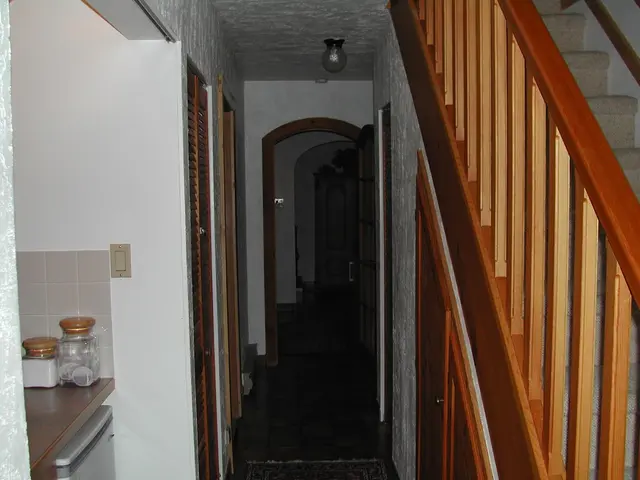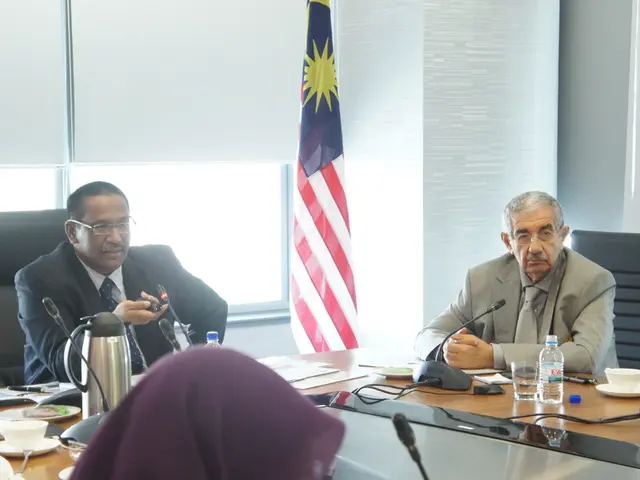"Saudi Thriller Unveils Hidden Realities Behind Riyadh's Progress"
In the gritty underbelly of Saudi nightlife, both glamorous and shady, Ali Kalthami's "Night Courier" ($Mandoob$ in Arabic) shines a light on thirty-something Fahad (Mohamad Aldokhei), a seemingly hapless call center employee who moonlights as a delivery man to pay his father's medical bills and support his divorced sister.
Struggling to make ends meet, Fahad finds himself making one unfavorable decision after another, eventually landing in the profitable world of delivering alcohol to the city's high society - only to wind up at odds with the gangs that usually control such operations.
In Saudi Arabia, the consumption and possession of alcohol is strictly forbidden and punishable by fines, imprisonment, and public flogging. However, on the black market, the sons of wealthy Saudi families can purchase alcohol at exorbitant prices, reaching several hundred euros for a bottle of whisky.
This nocturnal odyssey introduces Fahad to Riyadh's extravagant elite party scene, resulting in a profoundly shocking experience for the devout Muslim. Kalthami's camera captures the striking contrast between his clients' palatial penthouses and the rundown suburbs that Fahad calls home, painting a vivid picture of a rapidly changing city.
A city of contrasts and disparity
By exploring themes of poverty, social class division, and alcohol smuggling, "Night Courier" tackles head-on the social and economic realities of contemporary Saudi Arabia, an oil-rich Gulf state where the benefits of fossil fuels are far from universal.
In 2023, 13.6% of Saudis lived below the poverty line, according to the United Nations Economic and Social Commission for Western Asia (ESCWA).
"The film depicts situations I encountered in my life," says Kalthami, who hails from a poor district of Riyadh, a sprawling and rapidly changing metropolis he describes as "unyielding to all."
At 41, Kalthami is part of a new generation of filmmakers who are touted as emblems of the cultural 'openness' promoted by Crown Prince Mohammed bin Salman, the country's de facto ruler. Bin Salman has identified cinema and the arts as means to revamp the image of a nation long associated with repressive social policies.
Released domestically in late 2023, "Night Courier" was a commercial success at home, setting a record for a native film with over 600,000 ticket sales - a milestone for the Saudi film industry.
Blooming cinema scene
The film's success caught the attention of the streaming platform Netflix, which released it throughout the region last September.
"The Saudi film industry is still young – producing approximately three to five feature films a year – but it is experiencing a surge," says Maxime Bos, a former French diplomat who lived in Saudi Arabia for seven years and worked in the cultural sector. "There is a plethora of young directors, including women directors, and they have unusual and thought-provoking things to say."
Bos believes that the country's fledgling industry is "gradually finding its footing," with the emergence of writers, cinematographers, music composers, and other key professionals required for the sector.
Filmmakers in Saudi Arabia receive support from the Ministry of Culture, which funds training programs, co-productions, creative residencies, and the promotion of homegrown talent abroad. The industry can also rely on the growing influence of the Red Sea Film Festival, an international showcase for Saudi film that serves as a crucial instrument of the country's cultural soft power.
A creative outlet for youth
The growth of the Saudi film industry has paralleled the country's relative liberalization, with filmmakers tackling previously taboo societal issues.
"By green-lighting 'Night Courier', Saudi authorities aim to demonstrate the existence of Saudi cinema and artistic life, and their willingness to allow certain things to be shown," says Karim Sader, a political analyst and consultant specializing in the Gulf countries.
"However, it's not like the film is damaging the country's image," Sader advises. "It tells the story of one man's marginalization. It raises a social issue but does not undermine the government. It remains a controlled gesture of openness."
In a nation where 60% of the population is under 30, Bin Salman is banking on support from digital-savvy youth who are steeped in Western culture and eager to create their own narratives, argues the consultant.
"Bin Salman has chosen to grant them this 'privilege' of sorts, to have their own cinema, their own stories, their own outlet," says Sader. "Perhaps the ultimate goal is to divert frustrations that might have otherwise boiled over into the Arab Spring uprisings."
This article was adapted from the original in French by Benjamin Dodman.
Extra Insight:
In 2024, the Saudi film industry generated total revenues of SR845.6 million ($225.42 million), with the screening of 504 films, including 17 Saudi productions[1][4]. While revenues were slightly below peak levels of SR937 million in 2022 and SR922 million in 2023, the 2024 figures indicate sustained market stability[1][4].
The growth of the Saudi film industry has been marked by challenges, including leadership issues and recruitment difficulties at MBC Studios and Neom Media[3]. However, these hurdles have not prevented the industry from making international strides, with numerous Saudi titles becoming more visible on the global stage[2]. The Saudi film industry continues to evolve, offering a platform for diverse storytelling and potentially reshaping global perceptions of Saudi Arabia.
- The Saudi film industry, blooming with support from the Ministry of Culture and the Red Sea Film Festival, is experiencing a surge, producing approximately three to five feature films a year.
- The industry's success is not limited to domestic markets; the streaming platform Netflix has shown interest, releasing films like "Night Courier" throughout the region.
- As the industry gradually finds its footing, it is attracting a multitude of young directors, including women directors, who bring unusual and thought-provoking perspectives to the table.
- The growth of the Saudi film industry parallels the country's recent liberalization, allowing filmmakers to tackle previously taboo societal issues.
- In a nation where 60% of the population is under 30, the digital-savvy youth, steeped in Western culture, are eager to create their own narratives, potentially diverting frustrations that might have otherwise boiled over.
- The success of films like "Night Courier" serves as a controlled gesture of openness, demonstrating the existence of Saudi cinema and artistic life, and the government's willingness to allow certain things to be shown.
- perpetrating social and economic contrasts within the country, films like "Night Courier" shed light on the social and economic realities of contemporary Saudi Arabia, an oil-rich Gulf state where the benefits of fossil fuels are far from universal.









